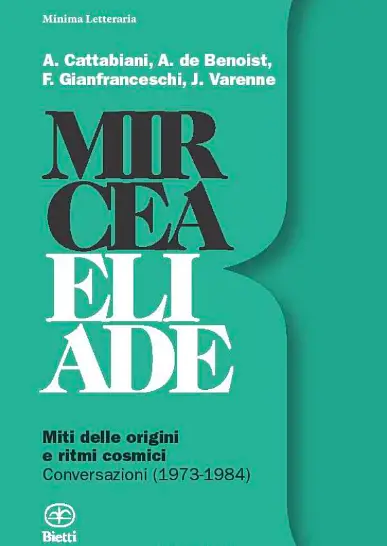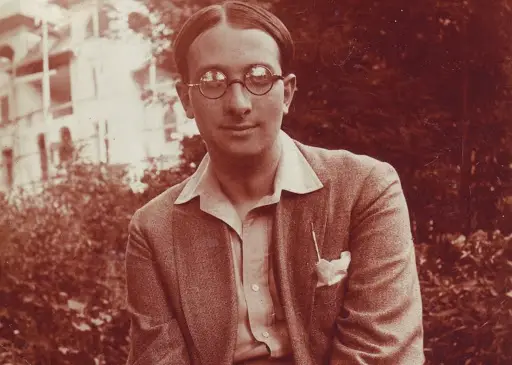114 years ago, on March 13, 1907, Mircea Eliade was born in Bucharest. For the occasion, let's spend a few words on booklet recently published by Edizioni Bietti for the “Minima Letteraria” series, in which you can read four interviews with the most important historian of 70th century religions released respectively to Jean Varenne, Alain de Benoist, Fausto Gianfranceschi and Alfredo Cattabiani, in the 80s and XNUMXs.
di Marco Maculotti
Cover: Mircea Eliade (right) with Carl Gustav Jung in Eranos
[…] I believe that, more than any other discipline, the history of religions prepares our contemporaries to become "citizens of the world".
Mircea Eliade, Myths of the origins and cosmic rhythms. Conversations 1973 - 1984, “Decantatore 30” (Presenze grafiche).
On these pages we have often quoted Mircea eliade and several times I have been asked which were the most suitable (not excessively "advanced") texts to approach his non-fiction work. The sacred and the profane e The myth of the eternal return, quite significant at the level of Eliiadian mythopoeia and yet easy to read, can be excellent choices to start with, as well as The nostalgia of the origins. But the mythographer Eliade also emerges clearly from the interviews he has undergone over the years, such as the splendid and full of ideas published in Italy with the title The test of the labyrinth.
However, a more streamlined publication on this genre was missing - at least to my knowledge - and recently Bietti Edizioni has filled the gap by publishing, for the "Minima Letteraria" series, Mircea Eliade. Myths of origins and cosmic rhythms. Conversations 1973 - 1984, curated by Horia Corneliu Cicortas and Andrea Scarabelli. This booklet contains four interviews made over a decade with the Romanian historian of religions, in which the questions are respectively asked by Jean Varenne (Indologist and historian of Asian religions), Alain de Benoist (philosopher and journalist), Fausto Gianfranceschi (journalist and writer) e Alfredo Cattabiani (folklore scholar and editor).
Conversations 1973 - 1984, considering the seventy standard pages for publications in this editorial series, it is a quick read, which can be easily completed in an hour or two. However, every single sentence implies decades of research and of these it is somehow the result, the juice, the extract. Each observation is almost a revelation, which may not surprise those who Eliade knows him for having already read his works, but for the layman it could be downright shocking. "To dominate in these four conversations", the editors anticipate in the introduction, "are the fundamental doctrines of Eliade, from the validity of the sacred to the original value of myth, from the need to make cultures interact with the value of the history of religions, from the denunciation of desacralization to the emergence of "new myths""(P. 12).

For example, we can start from the discussion on cosmic religiosity, which Eliade even recognized in certain forms of Christianity, mostly rural and connected to the cycles of the seasons (he spoke of it above all in his essays dedicated to the Romanian tradition, published in Italy by Astrolabio with the title From Zalmoxis to Genghis Khan):
what I call cosmic religion (or religiosity), that is to say that the sacred is manifested there through the human scent of cosmic rhythms.
(p.19)
From the Paleolithic to the Neolithic, up to the Gnostic and Manichaean heresies and then to medieval folklore, Eliade records the traces of a submerged cult that has remained somehow alive, underground, even in the last centuries, as although "rejected by Judaism, the cosmic religiosity always exists "(p. 43). On the other hand, she spots the Marxist-Communist eschatological myth of the end times as intimately connected to the "Judeo-Christian millennial prophecy":" A sort of profane parody of the myth of the Golden Age ", culminating in an eschatological" "final battle", followed by a heavenly state (the "classless society") "(pp. 44-45) - a theme that he had already addressed in the two collections of essays The myths of the modern world e Occultism, witchcraft and cultural fashions. In this way, Eliade wanted to demonstrate how even the avowedly anti-religious ideological currents were ultimately founded on a para-religious vision, although their acolytes ignored him and persecuted not only churchmen but even scholars of the history of religions, whom they viewed with suspicion.
In addition, in the light of these observations, perhaps one understands better the escape of Eliade from his beloved homeland, incorporated into the Soviet bloc from 1947. The Communist regime of Ceausescu he was overthrown by the Romanian revolution only in 1989, three years after Eliade's death in April 1986. For half a century he lived as an exile, between France and the United States - a destiny shared by another lofty mind of the young Romanian generation after World War II, his friend Emil cioran, and then by the pupil Ioan Petru Culianu. Here and there in the interviews collected here, however, others are named places of the soul of the scholar: fromIndia in which he spent a period in his youth in Renaissance Italy, especially the Florence of Papini, to study which he learned our language during his university years.
Mircea Eliade is comparable to solo Jung from the point of view of the impact on the collective notion of the Sacred and sacredness: similarly to the famous Swiss psychologist, he too understood that history of religions, for a long time relegated to theologians alone, it is instead «one discipline total, whose developments influence aspects of psychology, sociology and ethnology(P. 39), as he himself points out in the interview with de Benoist. And in the one in Varenne he states:
The awareness of the existence of a real and meaningful world is intimately linked to the discovery of the sacred. Through the experience of the sacred, the human mind grasps the difference between what turns out to be real, powerful, rich and meaningful, and what lacks these qualities, namely the chaotic and perilous flow of things, their appearance and disappearance. casual and meaningless. I mean that the sacred is an element in the structure of consciousness, and not a stage in the history of consciousness itself.
(p.27)
Living with a religious mentality - or rather it would be to say sacral - it is not indispensable for Eliade only to give meaning to one's own existence, but above all and in the first place for become aware of the sacredness of life in all its forms, to know how to see it and to know how to immerse oneself in it, to be able to rise from chaotic and perilous flow of things. Thus, partly taking up the theories of Ernesto DeMartino, affirms that "a miracle is recognizable only by those who live in a sacred dimension and participate in the religion in which it takes place" and that "for others it is unrecognizable"; but soon after, going far beyond the rationalistic anthropology of his colleague, he sibylline remarking that "The sacred is evident for those who can see it and absent for those who do not see it", because it is "both disguised and manifested in objects" (p.62).
With these premises, Eliade was able to state, in the interview with Varenne, that "all crises of modern man have a religious origin, quite simply because a crisis is above all the awareness of an absence of meaning"(P. 31). Conversely, in the exchange with Cattabiani he expresses the certainty that "man is such only insofar as he believes and lives in something significant, which does not belong to everyday life", and that "the loss of sacredness leads instead to anguish in the face to the banal flow of existence "(p. 63). Even in the awareness of living in an increasingly desacralized world, it is he himself who comments by putting forward the hypothesis that
in the depths of this process of desacralization the seed of a new type of sacredness could be hidden. I trust in the creative power of the spirit, in the freedom of man. The need for the sacred cannot be eradicated, and can emerge, as happened with the generation of hippies, in a nostalgia for paradise: what else could their escape from society, from institutions, the attempt to live in communion with the rhythms of the cosmos, refusing to work for money mean? They, while ignoring or rejecting institutional religious norms, betrayed with their behavior a nostalgia for the sacred, for paradise.
(p.64)

At the end of these brief notes it can be noted, if nothing else, how Eliade's point of view in the last years of his life was much less pessimistic than the concerns of the immediate postwar period, written both in the essayist (The myth of the eternal return) and in private correspondence (see in this regard the article dedicated to his correspondence with the aforementioned Cioran). Or perhaps, if not exactly optimistic, at least disenchanted. The interview with de Benoist, dated 1979, ends with these words:
I am not pessimistic, as I do not believe in absolute determinism. Today, Western civilization is transforming itself considerably. Europeans have lost their superiority complex. I hope this does not make us fall into an inferiority complex, on the other hand. From a certain point of view, our civilization today has more chances to renew itself than it ever has before. Besides, you never get out of history. It is possible to escape from it only through the spirit.
(p.46)

2 comments on “Conversations with Mircea Eliade"